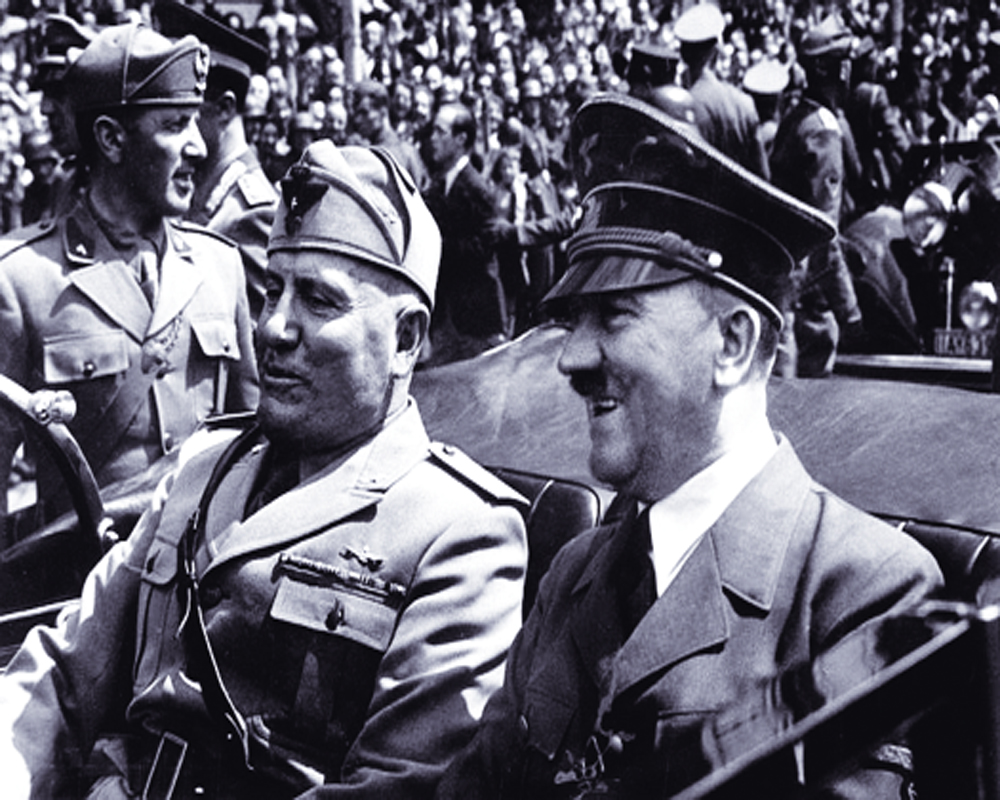So much for fascism and its smaller as well as grander (Spanish, and German) variations. But what is its ugly connection with Indian politics?
Speech with knowledge is a sermon and without knowledge is a pulpit. Leaders in Indian politics frequently use the word ‘fascism’ to abuse an Opposition party or its members without the slightest idea of what the word fascism means or signifies. To them it is an abusive alternative of despot.
Benito Mussolini, who initiated the fascist movement in March 1919, at Milan and founded the party called Partito Nazional Fascista in November 1921, is farfetched to have been abusive. Or, does the very word “fascist” connote political derogation? Perhaps it does to at least some members of the Indian intelligentsia. This is reason enough to recapitulate what fascism really means.
The word “fascio” means a bundle or a bunch implying unity. The movement was in response to the corruption, unemployment and the virtual economic collapse in Italy after World War I. The socio-economic conditions appeared to be ripe for a communist revolution and fascism was a nationalist answer to preempt such a take-over. Marxism was looked upon as depicting “class conflict”. Capitalism still carried the stigma of “class exploitation” and was, therefore, a non-starter as a popular programme. To be effective, the answer had to be something that would prove attractive to the peasants, workers as well as their unions and generally acceptable to all classes of people. This was discovered in “class collaboration” as represented by fascism.
Prof Alfredo Rocco, the Minister of Justice in the Mussolini cabinet, set forth the gist of this new ideology in the course of a speech at Perugia in 1925. According to him, the society does not exist for the individual, but the individual for the society. Economic progress is a social interest and all classes of people should collaborate to maximise production. The interests of the employers and the employed are identical. To ensure that this is practiced, there must be a system of State discipline over class conflicts. Strikes and lockouts were illegal and punishable by heavy fines and other punishments.
Wherever possible, the employers and workers in each industry, trade or profession were organised together in syndical associations. Where it was not possible to form such syndicates, the unions and the employers’ associations remained but cooperated to form guilds to coordinate and ensure cordiality. If collective bargaining could not end satisfactorily, the disputes were referred to law courts assisted by professional experts. This is how class collaboration was conceptualised by the Fascist Party.
In practice, the economy was toned up by rearmament and expenditure on public works. Soldiers were recruited in large numbers and so were workers in factories to produce arms. This would bring profits to the bourgeoisie who could then pay the proletariat well. Urban prosperity would increase demand for agricultural produce. What was left of the under-employed youth was absorbed by the armed forces. The promise to the whole nation were frequent attempts at foreign conquests which would bring booty.
Another example of the practice of fascism or class collaboration, albeit on a much more limited scale, was in Spain under General Franco. Neither the Italian nor the Spanish experience is widely known in any great detail especially in India. However, what the members of the intelligentsia are familiar with are the exploits of Adolf Hitler and his Nazi Party whose full name was National Socialist German Workingmen’s Party. It was founded by Adolf Hitler and his six comrades in Munich in 1920. The economic deprivation in Germany was much greater than that witnessed in Italy, mainly due to reparation payments under the Treaty of Versailles 1919 after World War I. The country paid an exorbitant price for its defeat in World War I. The runaway inflation as well as the world depression ignited by the crash in share prices on the Wall Street in New York in 1929 made matters worse for Germany. It was widely believed that the charismatic quality of Hitler and his programme of class collaboration more or less on the lines of Mussolini’s Italian ideology although, on a far grander scale, saved the country from utter collapse and a communist takeover in the 1930s.
Unlike the Italian and Spanish examples, the Nazi Party proposed to exclude Jews from German life. They alleged that the Jewish leadership had betrayed the State during World War I and were, to a large extent, responsible for the dire German defeat. In their bid to exterminate the Jews, not only from Germany but also from the rest of Europe, the Nazis were estimated to have killed six million Jews by 1945. While General Franco confined himself to Spain, Benito Mussolini did attempt foreign conquests of Albania and Ethiopia but his plans were nowhere as grandiose as Adolf Hitler’s. Which is why he is well-known not only in India but all over the world. Japan was another country, although a monarchy, that practiced class collaboration especially in the 1930s and 1940s.
So much for fascism and its smaller as well as grander (Spanish, and German) variations. But what is its ugly connection with politics in India? India is not Europe nor do we have class stratifications although communist trade unions did try to introduce them. The nineteen-nineties are not the thirties. Socialism is on its deathbed, and there is no fear of a communist take-over.
The writer is a well-known columnist, an author and a former member of the Rajya Sabha. The views expressed are personal.)

























